Organisational Behaviour Report: BP Case Study on Performance
VerifiedAdded on 2020/10/05
|17
|4591
|299
Report
AI Summary
This report provides a comprehensive analysis of organisational behaviour, focusing on how culture, politics, and power influence individual and team performance within an organisation. It delves into the impact of these factors, particularly within the context of British Petroleum (BP), examining how organisational culture affects employee behaviour and productivity. The report evaluates content and process theories of motivation, such as Maslow's hierarchy of needs and Skinner's reinforcement theory, and their application in achieving organisational goals. Furthermore, it explores team development theories, highlighting the elements of effective and ineffective teams. Finally, the report applies organisational behaviour concepts to a given business situation, offering insights into how these principles inform and influence workplace behaviour, with a focus on the case study of BP.
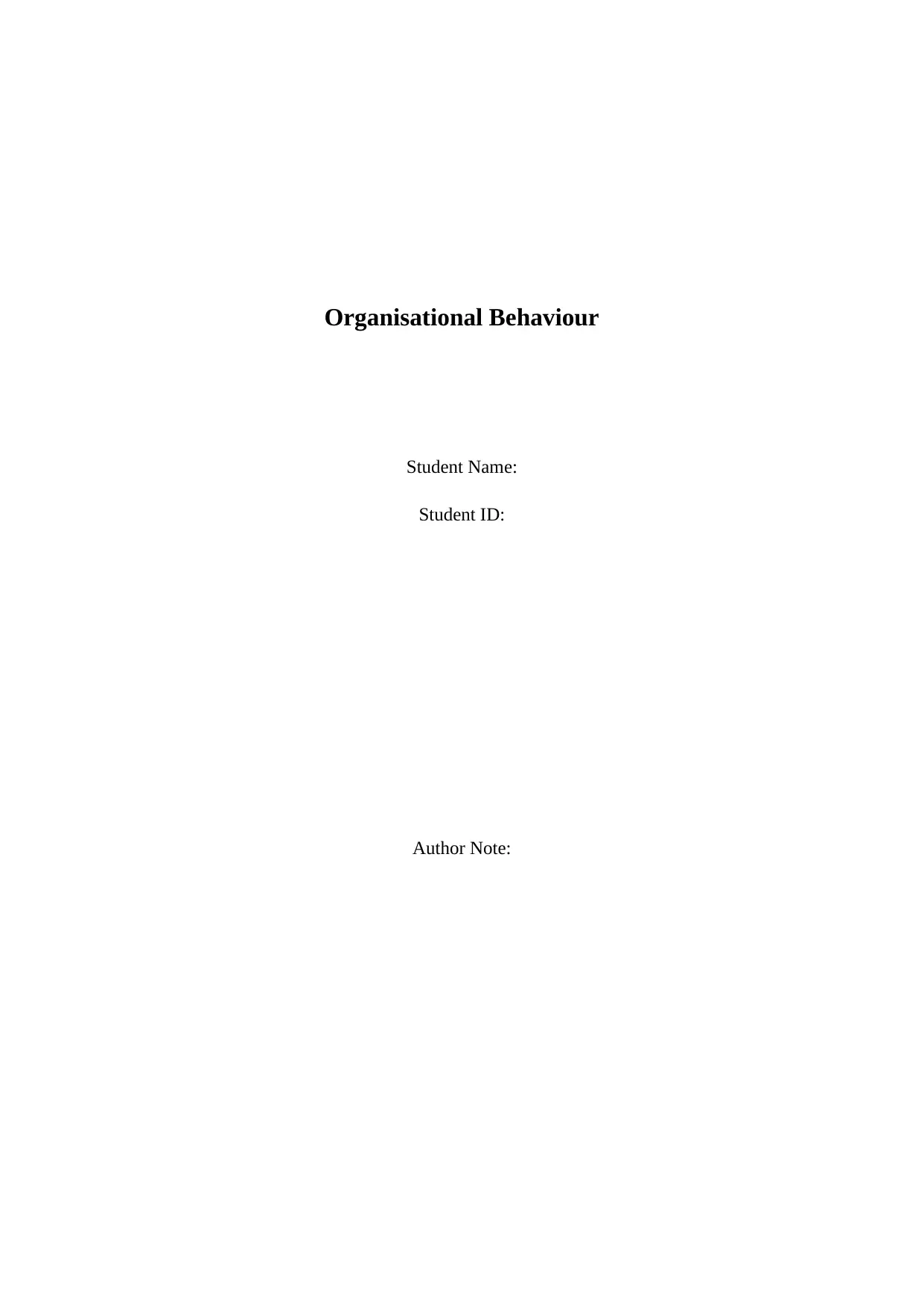
Organisational Behaviour
Student Name:
Student ID:
Author Note:
Student Name:
Student ID:
Author Note:
Paraphrase This Document
Need a fresh take? Get an instant paraphrase of this document with our AI Paraphraser
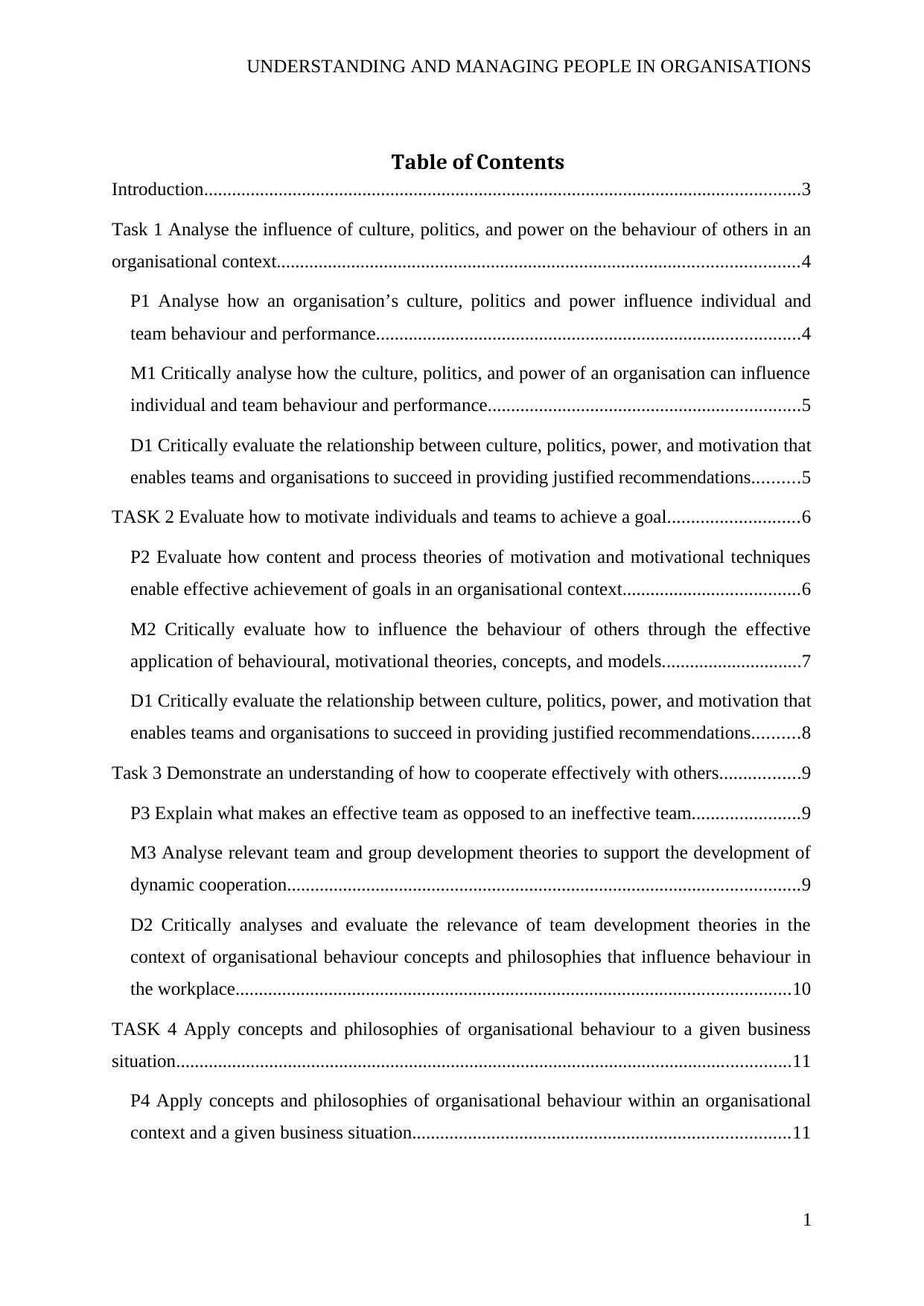
UNDERSTANDING AND MANAGING PEOPLE IN ORGANISATIONS
Table of Contents
Introduction................................................................................................................................3
Task 1 Analyse the influence of culture, politics, and power on the behaviour of others in an
organisational context................................................................................................................4
P1 Analyse how an organisation’s culture, politics and power influence individual and
team behaviour and performance...........................................................................................4
M1 Critically analyse how the culture, politics, and power of an organisation can influence
individual and team behaviour and performance...................................................................5
D1 Critically evaluate the relationship between culture, politics, power, and motivation that
enables teams and organisations to succeed in providing justified recommendations..........5
TASK 2 Evaluate how to motivate individuals and teams to achieve a goal............................6
P2 Evaluate how content and process theories of motivation and motivational techniques
enable effective achievement of goals in an organisational context......................................6
M2 Critically evaluate how to influence the behaviour of others through the effective
application of behavioural, motivational theories, concepts, and models..............................7
D1 Critically evaluate the relationship between culture, politics, power, and motivation that
enables teams and organisations to succeed in providing justified recommendations..........8
Task 3 Demonstrate an understanding of how to cooperate effectively with others.................9
P3 Explain what makes an effective team as opposed to an ineffective team.......................9
M3 Analyse relevant team and group development theories to support the development of
dynamic cooperation..............................................................................................................9
D2 Critically analyses and evaluate the relevance of team development theories in the
context of organisational behaviour concepts and philosophies that influence behaviour in
the workplace.......................................................................................................................10
TASK 4 Apply concepts and philosophies of organisational behaviour to a given business
situation....................................................................................................................................11
P4 Apply concepts and philosophies of organisational behaviour within an organisational
context and a given business situation.................................................................................11
1
Table of Contents
Introduction................................................................................................................................3
Task 1 Analyse the influence of culture, politics, and power on the behaviour of others in an
organisational context................................................................................................................4
P1 Analyse how an organisation’s culture, politics and power influence individual and
team behaviour and performance...........................................................................................4
M1 Critically analyse how the culture, politics, and power of an organisation can influence
individual and team behaviour and performance...................................................................5
D1 Critically evaluate the relationship between culture, politics, power, and motivation that
enables teams and organisations to succeed in providing justified recommendations..........5
TASK 2 Evaluate how to motivate individuals and teams to achieve a goal............................6
P2 Evaluate how content and process theories of motivation and motivational techniques
enable effective achievement of goals in an organisational context......................................6
M2 Critically evaluate how to influence the behaviour of others through the effective
application of behavioural, motivational theories, concepts, and models..............................7
D1 Critically evaluate the relationship between culture, politics, power, and motivation that
enables teams and organisations to succeed in providing justified recommendations..........8
Task 3 Demonstrate an understanding of how to cooperate effectively with others.................9
P3 Explain what makes an effective team as opposed to an ineffective team.......................9
M3 Analyse relevant team and group development theories to support the development of
dynamic cooperation..............................................................................................................9
D2 Critically analyses and evaluate the relevance of team development theories in the
context of organisational behaviour concepts and philosophies that influence behaviour in
the workplace.......................................................................................................................10
TASK 4 Apply concepts and philosophies of organisational behaviour to a given business
situation....................................................................................................................................11
P4 Apply concepts and philosophies of organisational behaviour within an organisational
context and a given business situation.................................................................................11
1
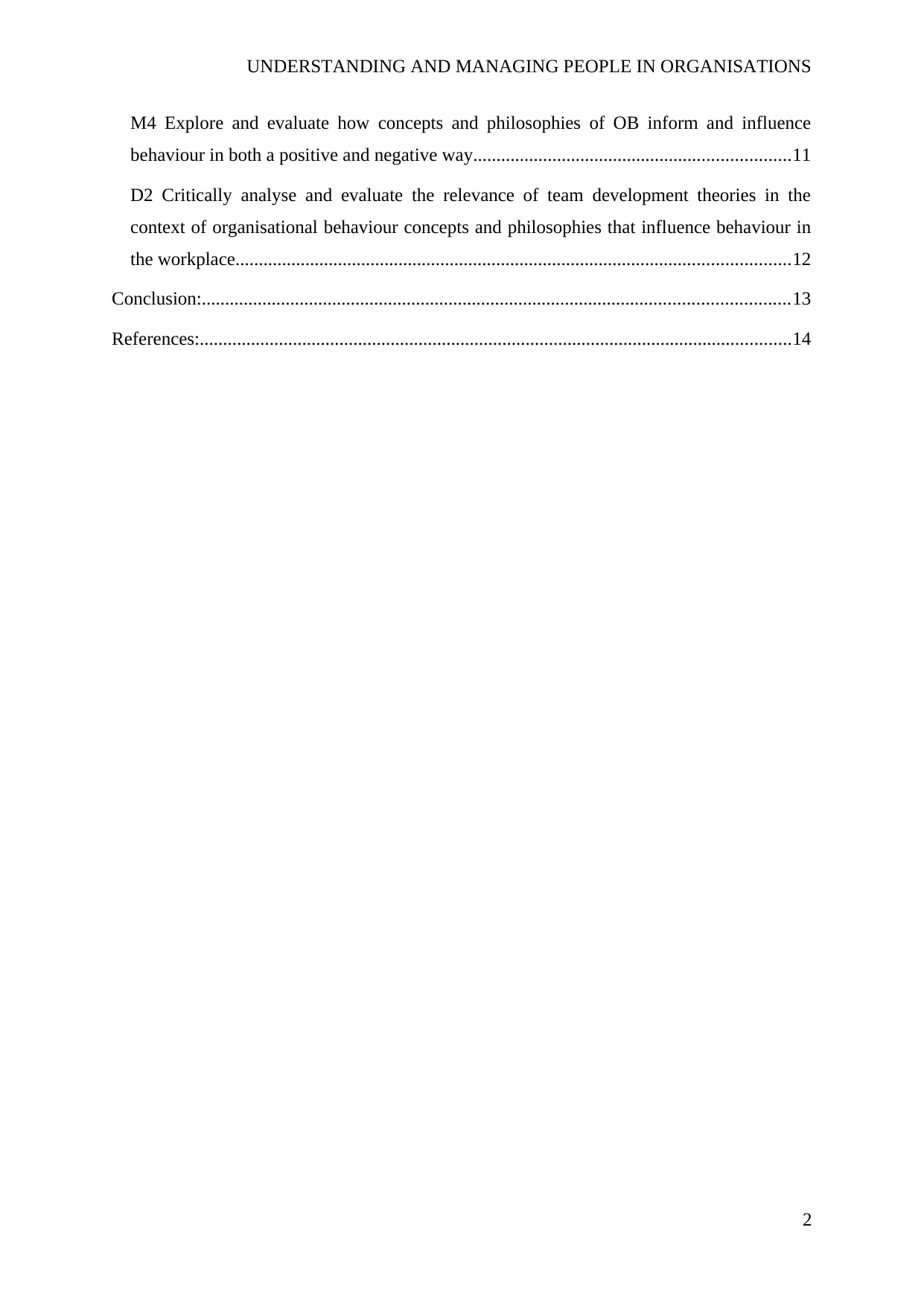
UNDERSTANDING AND MANAGING PEOPLE IN ORGANISATIONS
M4 Explore and evaluate how concepts and philosophies of OB inform and influence
behaviour in both a positive and negative way....................................................................11
D2 Critically analyse and evaluate the relevance of team development theories in the
context of organisational behaviour concepts and philosophies that influence behaviour in
the workplace.......................................................................................................................12
Conclusion:..............................................................................................................................13
References:...............................................................................................................................14
2
M4 Explore and evaluate how concepts and philosophies of OB inform and influence
behaviour in both a positive and negative way....................................................................11
D2 Critically analyse and evaluate the relevance of team development theories in the
context of organisational behaviour concepts and philosophies that influence behaviour in
the workplace.......................................................................................................................12
Conclusion:..............................................................................................................................13
References:...............................................................................................................................14
2
⊘ This is a preview!⊘
Do you want full access?
Subscribe today to unlock all pages.

Trusted by 1+ million students worldwide
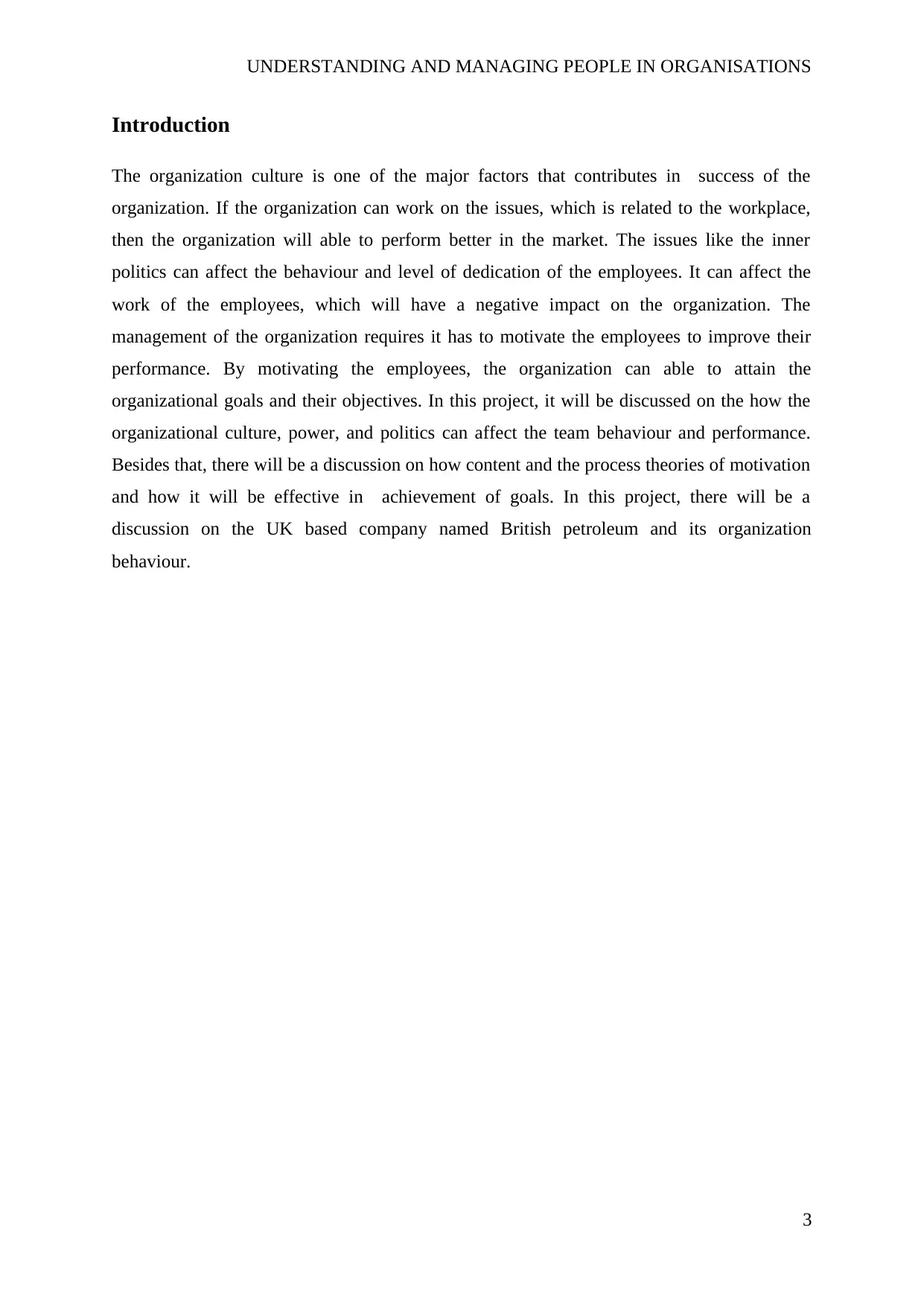
UNDERSTANDING AND MANAGING PEOPLE IN ORGANISATIONS
Introduction
The organization culture is one of the major factors that contributes in success of the
organization. If the organization can work on the issues, which is related to the workplace,
then the organization will able to perform better in the market. The issues like the inner
politics can affect the behaviour and level of dedication of the employees. It can affect the
work of the employees, which will have a negative impact on the organization. The
management of the organization requires it has to motivate the employees to improve their
performance. By motivating the employees, the organization can able to attain the
organizational goals and their objectives. In this project, it will be discussed on the how the
organizational culture, power, and politics can affect the team behaviour and performance.
Besides that, there will be a discussion on how content and the process theories of motivation
and how it will be effective in achievement of goals. In this project, there will be a
discussion on the UK based company named British petroleum and its organization
behaviour.
3
Introduction
The organization culture is one of the major factors that contributes in success of the
organization. If the organization can work on the issues, which is related to the workplace,
then the organization will able to perform better in the market. The issues like the inner
politics can affect the behaviour and level of dedication of the employees. It can affect the
work of the employees, which will have a negative impact on the organization. The
management of the organization requires it has to motivate the employees to improve their
performance. By motivating the employees, the organization can able to attain the
organizational goals and their objectives. In this project, it will be discussed on the how the
organizational culture, power, and politics can affect the team behaviour and performance.
Besides that, there will be a discussion on how content and the process theories of motivation
and how it will be effective in achievement of goals. In this project, there will be a
discussion on the UK based company named British petroleum and its organization
behaviour.
3
Paraphrase This Document
Need a fresh take? Get an instant paraphrase of this document with our AI Paraphraser
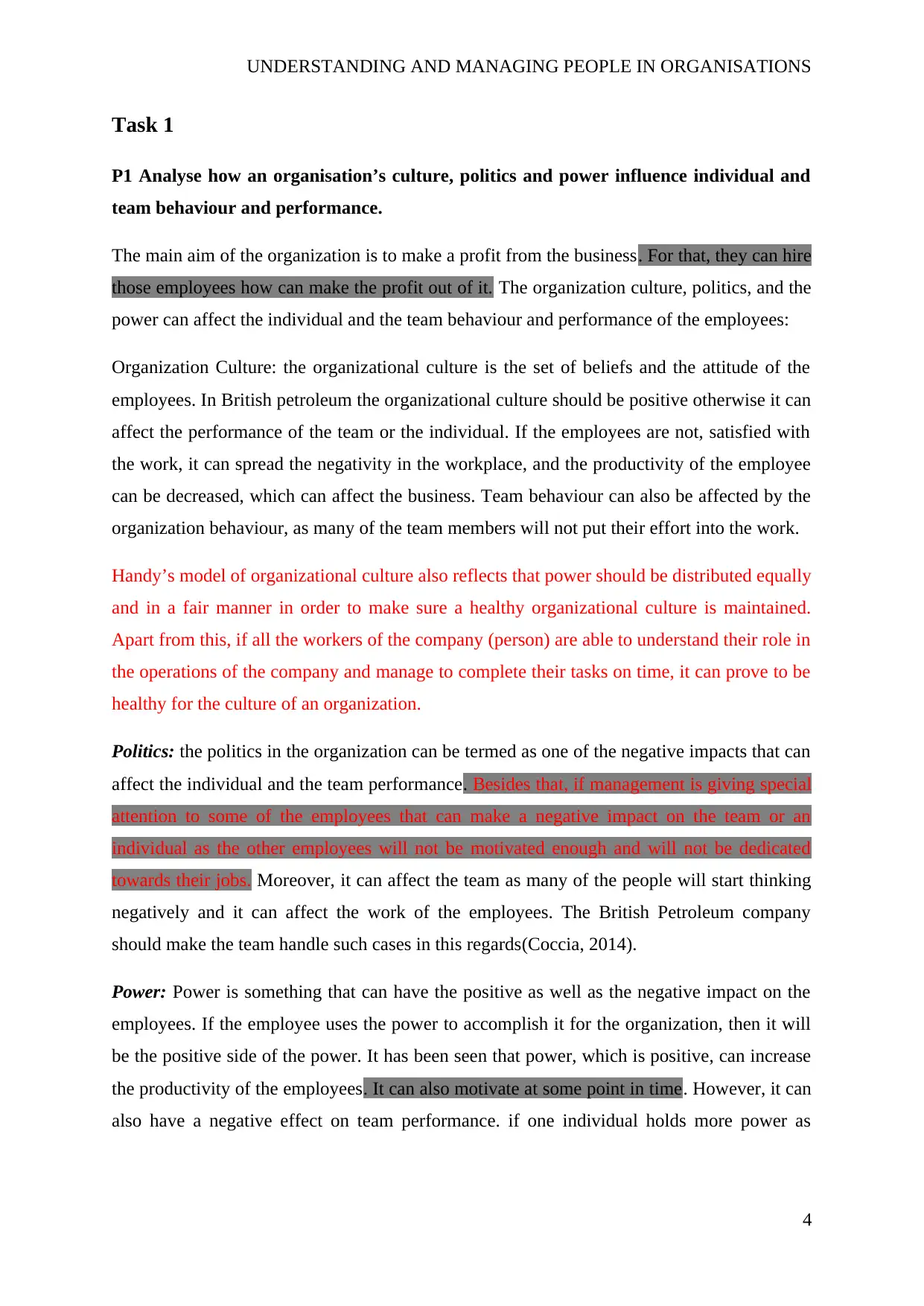
UNDERSTANDING AND MANAGING PEOPLE IN ORGANISATIONS
Task 1
P1 Analyse how an organisation’s culture, politics and power influence individual and
team behaviour and performance.
The main aim of the organization is to make a profit from the business. For that, they can hire
those employees how can make the profit out of it. The organization culture, politics, and the
power can affect the individual and the team behaviour and performance of the employees:
Organization Culture: the organizational culture is the set of beliefs and the attitude of the
employees. In British petroleum the organizational culture should be positive otherwise it can
affect the performance of the team or the individual. If the employees are not, satisfied with
the work, it can spread the negativity in the workplace, and the productivity of the employee
can be decreased, which can affect the business. Team behaviour can also be affected by the
organization behaviour, as many of the team members will not put their effort into the work.
Handy’s model of organizational culture also reflects that power should be distributed equally
and in a fair manner in order to make sure a healthy organizational culture is maintained.
Apart from this, if all the workers of the company (person) are able to understand their role in
the operations of the company and manage to complete their tasks on time, it can prove to be
healthy for the culture of an organization.
Politics: the politics in the organization can be termed as one of the negative impacts that can
affect the individual and the team performance. Besides that, if management is giving special
attention to some of the employees that can make a negative impact on the team or an
individual as the other employees will not be motivated enough and will not be dedicated
towards their jobs. Moreover, it can affect the team as many of the people will start thinking
negatively and it can affect the work of the employees. The British Petroleum company
should make the team handle such cases in this regards(Coccia, 2014).
Power: Power is something that can have the positive as well as the negative impact on the
employees. If the employee uses the power to accomplish it for the organization, then it will
be the positive side of the power. It has been seen that power, which is positive, can increase
the productivity of the employees. It can also motivate at some point in time. However, it can
also have a negative effect on team performance. if one individual holds more power as
4
Task 1
P1 Analyse how an organisation’s culture, politics and power influence individual and
team behaviour and performance.
The main aim of the organization is to make a profit from the business. For that, they can hire
those employees how can make the profit out of it. The organization culture, politics, and the
power can affect the individual and the team behaviour and performance of the employees:
Organization Culture: the organizational culture is the set of beliefs and the attitude of the
employees. In British petroleum the organizational culture should be positive otherwise it can
affect the performance of the team or the individual. If the employees are not, satisfied with
the work, it can spread the negativity in the workplace, and the productivity of the employee
can be decreased, which can affect the business. Team behaviour can also be affected by the
organization behaviour, as many of the team members will not put their effort into the work.
Handy’s model of organizational culture also reflects that power should be distributed equally
and in a fair manner in order to make sure a healthy organizational culture is maintained.
Apart from this, if all the workers of the company (person) are able to understand their role in
the operations of the company and manage to complete their tasks on time, it can prove to be
healthy for the culture of an organization.
Politics: the politics in the organization can be termed as one of the negative impacts that can
affect the individual and the team performance. Besides that, if management is giving special
attention to some of the employees that can make a negative impact on the team or an
individual as the other employees will not be motivated enough and will not be dedicated
towards their jobs. Moreover, it can affect the team as many of the people will start thinking
negatively and it can affect the work of the employees. The British Petroleum company
should make the team handle such cases in this regards(Coccia, 2014).
Power: Power is something that can have the positive as well as the negative impact on the
employees. If the employee uses the power to accomplish it for the organization, then it will
be the positive side of the power. It has been seen that power, which is positive, can increase
the productivity of the employees. It can also motivate at some point in time. However, it can
also have a negative effect on team performance. if one individual holds more power as
4
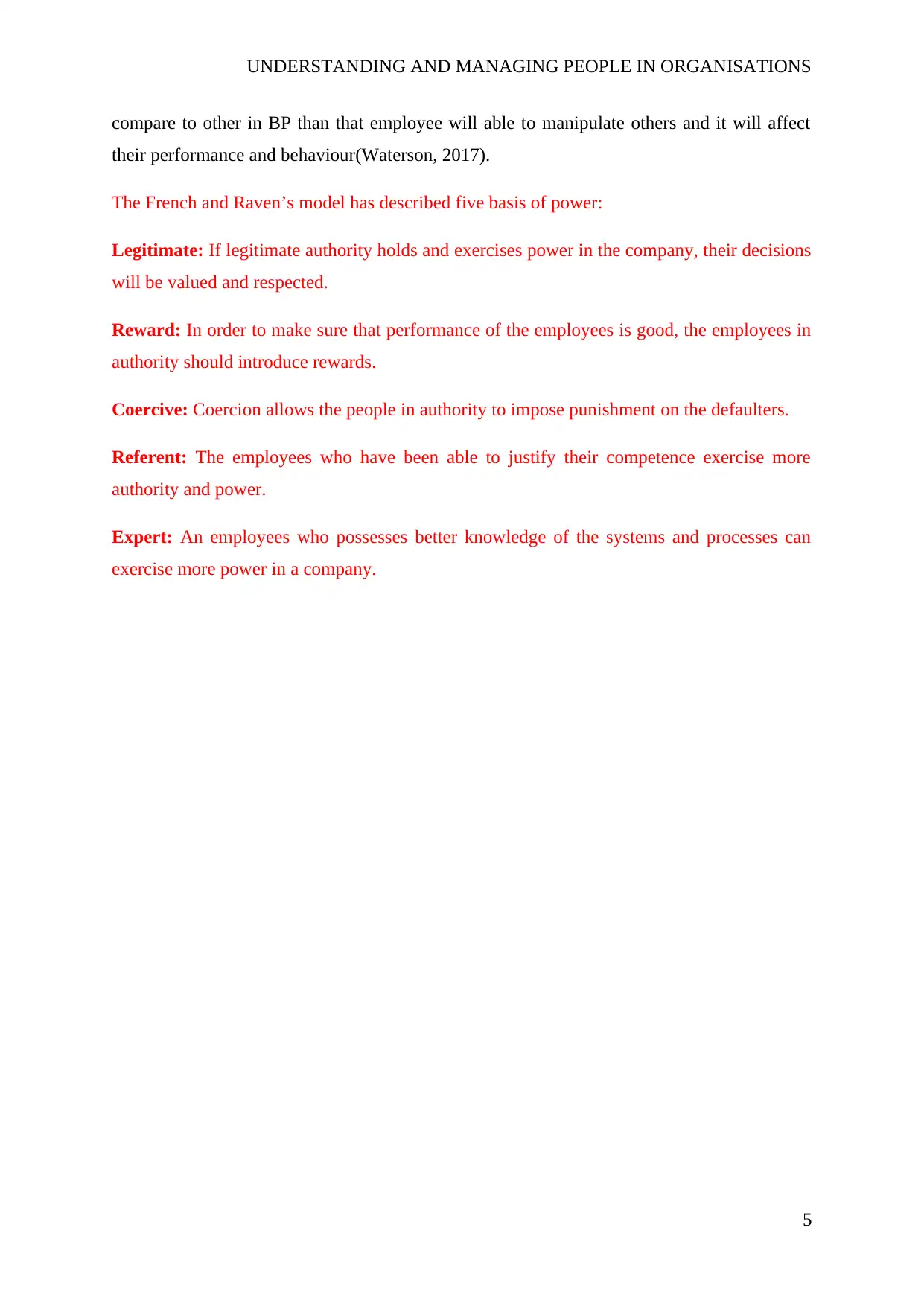
UNDERSTANDING AND MANAGING PEOPLE IN ORGANISATIONS
compare to other in BP than that employee will able to manipulate others and it will affect
their performance and behaviour(Waterson, 2017).
The French and Raven’s model has described five basis of power:
Legitimate: If legitimate authority holds and exercises power in the company, their decisions
will be valued and respected.
Reward: In order to make sure that performance of the employees is good, the employees in
authority should introduce rewards.
Coercive: Coercion allows the people in authority to impose punishment on the defaulters.
Referent: The employees who have been able to justify their competence exercise more
authority and power.
Expert: An employees who possesses better knowledge of the systems and processes can
exercise more power in a company.
5
compare to other in BP than that employee will able to manipulate others and it will affect
their performance and behaviour(Waterson, 2017).
The French and Raven’s model has described five basis of power:
Legitimate: If legitimate authority holds and exercises power in the company, their decisions
will be valued and respected.
Reward: In order to make sure that performance of the employees is good, the employees in
authority should introduce rewards.
Coercive: Coercion allows the people in authority to impose punishment on the defaulters.
Referent: The employees who have been able to justify their competence exercise more
authority and power.
Expert: An employees who possesses better knowledge of the systems and processes can
exercise more power in a company.
5
⊘ This is a preview!⊘
Do you want full access?
Subscribe today to unlock all pages.

Trusted by 1+ million students worldwide
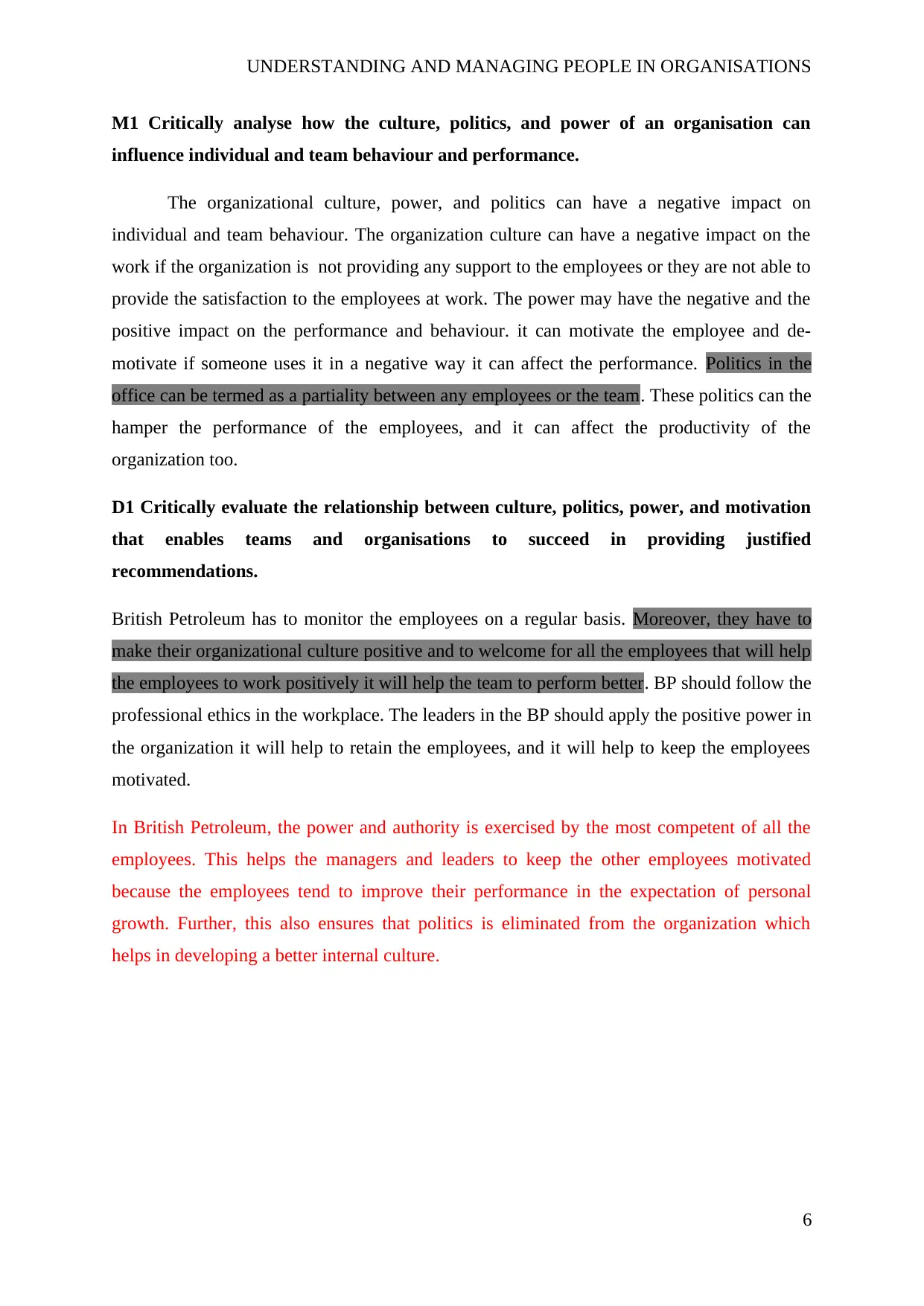
UNDERSTANDING AND MANAGING PEOPLE IN ORGANISATIONS
M1 Critically analyse how the culture, politics, and power of an organisation can
influence individual and team behaviour and performance.
The organizational culture, power, and politics can have a negative impact on
individual and team behaviour. The organization culture can have a negative impact on the
work if the organization is not providing any support to the employees or they are not able to
provide the satisfaction to the employees at work. The power may have the negative and the
positive impact on the performance and behaviour. it can motivate the employee and de-
motivate if someone uses it in a negative way it can affect the performance. Politics in the
office can be termed as a partiality between any employees or the team. These politics can the
hamper the performance of the employees, and it can affect the productivity of the
organization too.
D1 Critically evaluate the relationship between culture, politics, power, and motivation
that enables teams and organisations to succeed in providing justified
recommendations.
British Petroleum has to monitor the employees on a regular basis. Moreover, they have to
make their organizational culture positive and to welcome for all the employees that will help
the employees to work positively it will help the team to perform better. BP should follow the
professional ethics in the workplace. The leaders in the BP should apply the positive power in
the organization it will help to retain the employees, and it will help to keep the employees
motivated.
In British Petroleum, the power and authority is exercised by the most competent of all the
employees. This helps the managers and leaders to keep the other employees motivated
because the employees tend to improve their performance in the expectation of personal
growth. Further, this also ensures that politics is eliminated from the organization which
helps in developing a better internal culture.
6
M1 Critically analyse how the culture, politics, and power of an organisation can
influence individual and team behaviour and performance.
The organizational culture, power, and politics can have a negative impact on
individual and team behaviour. The organization culture can have a negative impact on the
work if the organization is not providing any support to the employees or they are not able to
provide the satisfaction to the employees at work. The power may have the negative and the
positive impact on the performance and behaviour. it can motivate the employee and de-
motivate if someone uses it in a negative way it can affect the performance. Politics in the
office can be termed as a partiality between any employees or the team. These politics can the
hamper the performance of the employees, and it can affect the productivity of the
organization too.
D1 Critically evaluate the relationship between culture, politics, power, and motivation
that enables teams and organisations to succeed in providing justified
recommendations.
British Petroleum has to monitor the employees on a regular basis. Moreover, they have to
make their organizational culture positive and to welcome for all the employees that will help
the employees to work positively it will help the team to perform better. BP should follow the
professional ethics in the workplace. The leaders in the BP should apply the positive power in
the organization it will help to retain the employees, and it will help to keep the employees
motivated.
In British Petroleum, the power and authority is exercised by the most competent of all the
employees. This helps the managers and leaders to keep the other employees motivated
because the employees tend to improve their performance in the expectation of personal
growth. Further, this also ensures that politics is eliminated from the organization which
helps in developing a better internal culture.
6
Paraphrase This Document
Need a fresh take? Get an instant paraphrase of this document with our AI Paraphraser
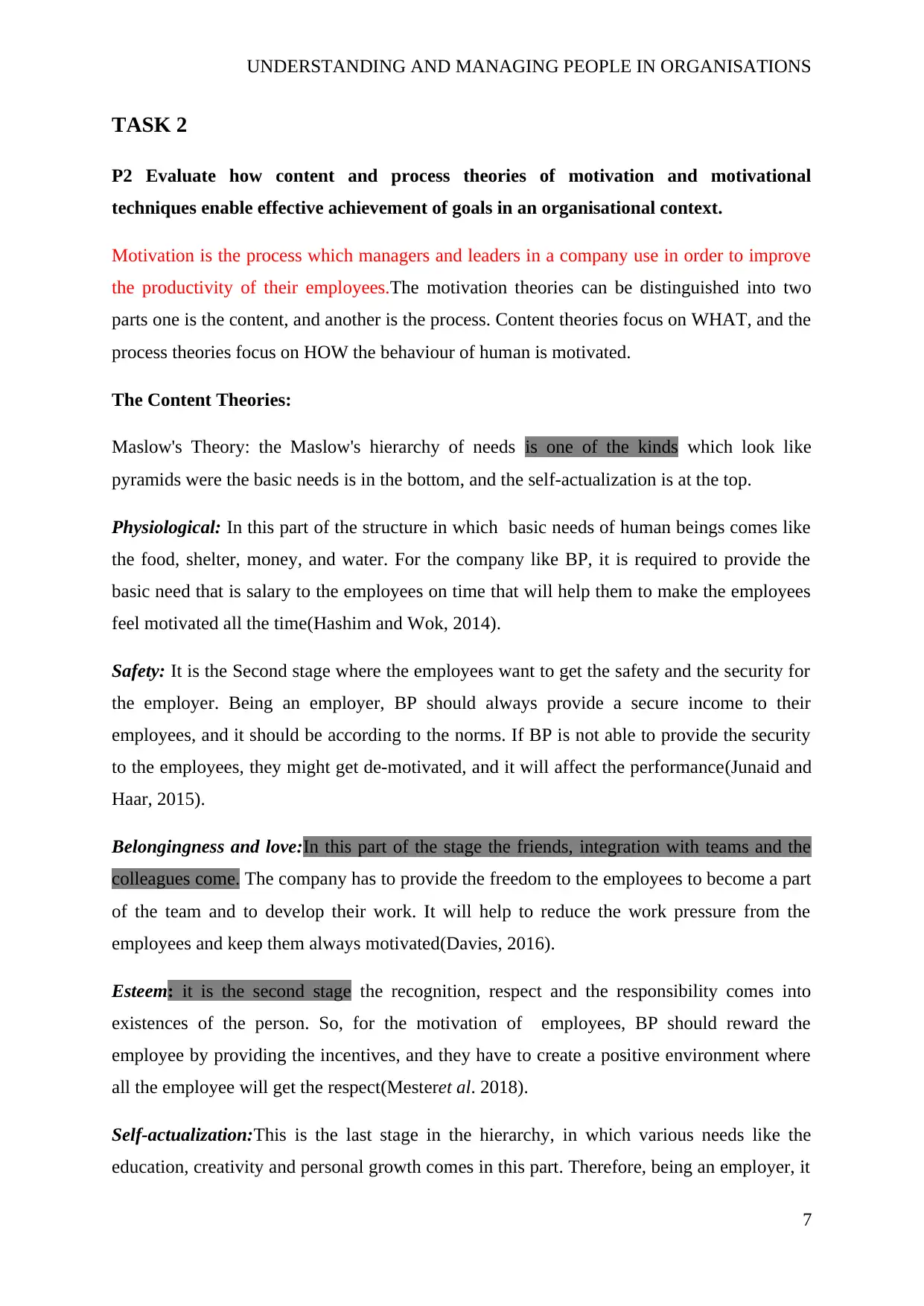
UNDERSTANDING AND MANAGING PEOPLE IN ORGANISATIONS
TASK 2
P2 Evaluate how content and process theories of motivation and motivational
techniques enable effective achievement of goals in an organisational context.
Motivation is the process which managers and leaders in a company use in order to improve
the productivity of their employees.The motivation theories can be distinguished into two
parts one is the content, and another is the process. Content theories focus on WHAT, and the
process theories focus on HOW the behaviour of human is motivated.
The Content Theories:
Maslow's Theory: the Maslow's hierarchy of needs is one of the kinds which look like
pyramids were the basic needs is in the bottom, and the self-actualization is at the top.
Physiological: In this part of the structure in which basic needs of human beings comes like
the food, shelter, money, and water. For the company like BP, it is required to provide the
basic need that is salary to the employees on time that will help them to make the employees
feel motivated all the time(Hashim and Wok, 2014).
Safety: It is the Second stage where the employees want to get the safety and the security for
the employer. Being an employer, BP should always provide a secure income to their
employees, and it should be according to the norms. If BP is not able to provide the security
to the employees, they might get de-motivated, and it will affect the performance(Junaid and
Haar, 2015).
Belongingness and love:In this part of the stage the friends, integration with teams and the
colleagues come. The company has to provide the freedom to the employees to become a part
of the team and to develop their work. It will help to reduce the work pressure from the
employees and keep them always motivated(Davies, 2016).
Esteem: it is the second stage the recognition, respect and the responsibility comes into
existences of the person. So, for the motivation of employees, BP should reward the
employee by providing the incentives, and they have to create a positive environment where
all the employee will get the respect(Mesteret al. 2018).
Self-actualization:This is the last stage in the hierarchy, in which various needs like the
education, creativity and personal growth comes in this part. Therefore, being an employer, it
7
TASK 2
P2 Evaluate how content and process theories of motivation and motivational
techniques enable effective achievement of goals in an organisational context.
Motivation is the process which managers and leaders in a company use in order to improve
the productivity of their employees.The motivation theories can be distinguished into two
parts one is the content, and another is the process. Content theories focus on WHAT, and the
process theories focus on HOW the behaviour of human is motivated.
The Content Theories:
Maslow's Theory: the Maslow's hierarchy of needs is one of the kinds which look like
pyramids were the basic needs is in the bottom, and the self-actualization is at the top.
Physiological: In this part of the structure in which basic needs of human beings comes like
the food, shelter, money, and water. For the company like BP, it is required to provide the
basic need that is salary to the employees on time that will help them to make the employees
feel motivated all the time(Hashim and Wok, 2014).
Safety: It is the Second stage where the employees want to get the safety and the security for
the employer. Being an employer, BP should always provide a secure income to their
employees, and it should be according to the norms. If BP is not able to provide the security
to the employees, they might get de-motivated, and it will affect the performance(Junaid and
Haar, 2015).
Belongingness and love:In this part of the stage the friends, integration with teams and the
colleagues come. The company has to provide the freedom to the employees to become a part
of the team and to develop their work. It will help to reduce the work pressure from the
employees and keep them always motivated(Davies, 2016).
Esteem: it is the second stage the recognition, respect and the responsibility comes into
existences of the person. So, for the motivation of employees, BP should reward the
employee by providing the incentives, and they have to create a positive environment where
all the employee will get the respect(Mesteret al. 2018).
Self-actualization:This is the last stage in the hierarchy, in which various needs like the
education, creativity and personal growth comes in this part. Therefore, being an employer, it
7
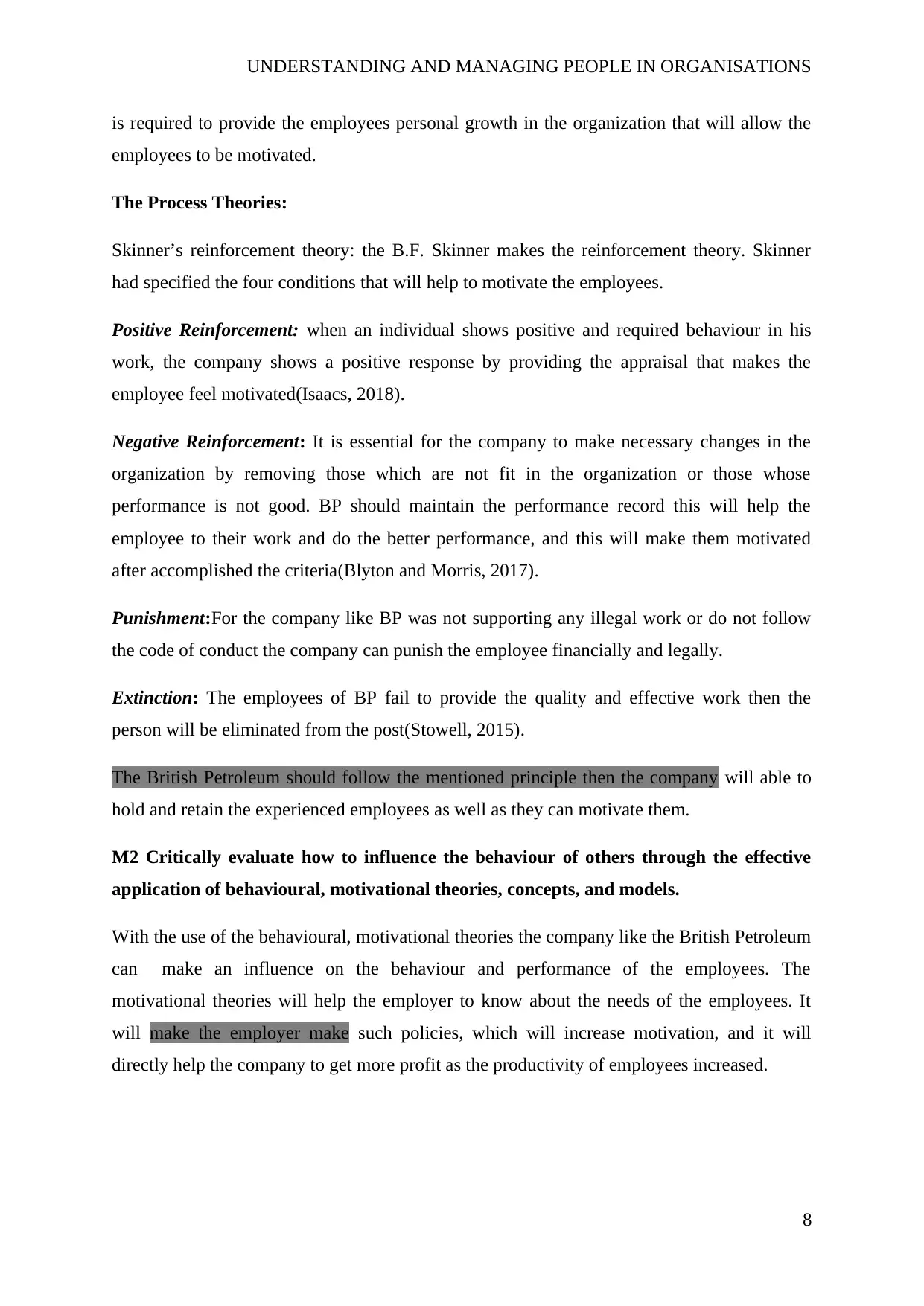
UNDERSTANDING AND MANAGING PEOPLE IN ORGANISATIONS
is required to provide the employees personal growth in the organization that will allow the
employees to be motivated.
The Process Theories:
Skinner’s reinforcement theory: the B.F. Skinner makes the reinforcement theory. Skinner
had specified the four conditions that will help to motivate the employees.
Positive Reinforcement: when an individual shows positive and required behaviour in his
work, the company shows a positive response by providing the appraisal that makes the
employee feel motivated(Isaacs, 2018).
Negative Reinforcement: It is essential for the company to make necessary changes in the
organization by removing those which are not fit in the organization or those whose
performance is not good. BP should maintain the performance record this will help the
employee to their work and do the better performance, and this will make them motivated
after accomplished the criteria(Blyton and Morris, 2017).
Punishment:For the company like BP was not supporting any illegal work or do not follow
the code of conduct the company can punish the employee financially and legally.
Extinction: The employees of BP fail to provide the quality and effective work then the
person will be eliminated from the post(Stowell, 2015).
The British Petroleum should follow the mentioned principle then the company will able to
hold and retain the experienced employees as well as they can motivate them.
M2 Critically evaluate how to influence the behaviour of others through the effective
application of behavioural, motivational theories, concepts, and models.
With the use of the behavioural, motivational theories the company like the British Petroleum
can make an influence on the behaviour and performance of the employees. The
motivational theories will help the employer to know about the needs of the employees. It
will make the employer make such policies, which will increase motivation, and it will
directly help the company to get more profit as the productivity of employees increased.
8
is required to provide the employees personal growth in the organization that will allow the
employees to be motivated.
The Process Theories:
Skinner’s reinforcement theory: the B.F. Skinner makes the reinforcement theory. Skinner
had specified the four conditions that will help to motivate the employees.
Positive Reinforcement: when an individual shows positive and required behaviour in his
work, the company shows a positive response by providing the appraisal that makes the
employee feel motivated(Isaacs, 2018).
Negative Reinforcement: It is essential for the company to make necessary changes in the
organization by removing those which are not fit in the organization or those whose
performance is not good. BP should maintain the performance record this will help the
employee to their work and do the better performance, and this will make them motivated
after accomplished the criteria(Blyton and Morris, 2017).
Punishment:For the company like BP was not supporting any illegal work or do not follow
the code of conduct the company can punish the employee financially and legally.
Extinction: The employees of BP fail to provide the quality and effective work then the
person will be eliminated from the post(Stowell, 2015).
The British Petroleum should follow the mentioned principle then the company will able to
hold and retain the experienced employees as well as they can motivate them.
M2 Critically evaluate how to influence the behaviour of others through the effective
application of behavioural, motivational theories, concepts, and models.
With the use of the behavioural, motivational theories the company like the British Petroleum
can make an influence on the behaviour and performance of the employees. The
motivational theories will help the employer to know about the needs of the employees. It
will make the employer make such policies, which will increase motivation, and it will
directly help the company to get more profit as the productivity of employees increased.
8
⊘ This is a preview!⊘
Do you want full access?
Subscribe today to unlock all pages.

Trusted by 1+ million students worldwide
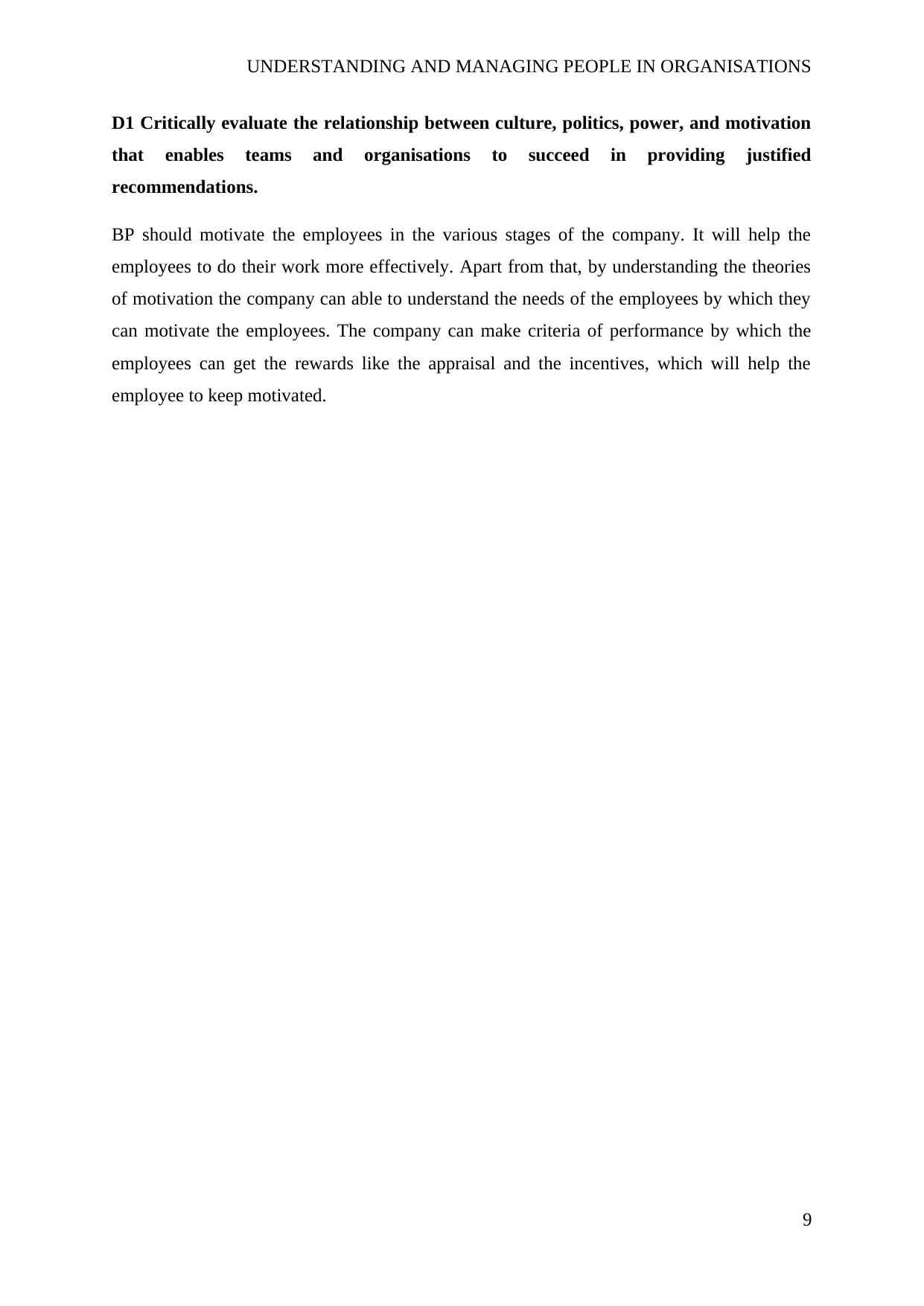
UNDERSTANDING AND MANAGING PEOPLE IN ORGANISATIONS
D1 Critically evaluate the relationship between culture, politics, power, and motivation
that enables teams and organisations to succeed in providing justified
recommendations.
BP should motivate the employees in the various stages of the company. It will help the
employees to do their work more effectively. Apart from that, by understanding the theories
of motivation the company can able to understand the needs of the employees by which they
can motivate the employees. The company can make criteria of performance by which the
employees can get the rewards like the appraisal and the incentives, which will help the
employee to keep motivated.
9
D1 Critically evaluate the relationship between culture, politics, power, and motivation
that enables teams and organisations to succeed in providing justified
recommendations.
BP should motivate the employees in the various stages of the company. It will help the
employees to do their work more effectively. Apart from that, by understanding the theories
of motivation the company can able to understand the needs of the employees by which they
can motivate the employees. The company can make criteria of performance by which the
employees can get the rewards like the appraisal and the incentives, which will help the
employee to keep motivated.
9
Paraphrase This Document
Need a fresh take? Get an instant paraphrase of this document with our AI Paraphraser
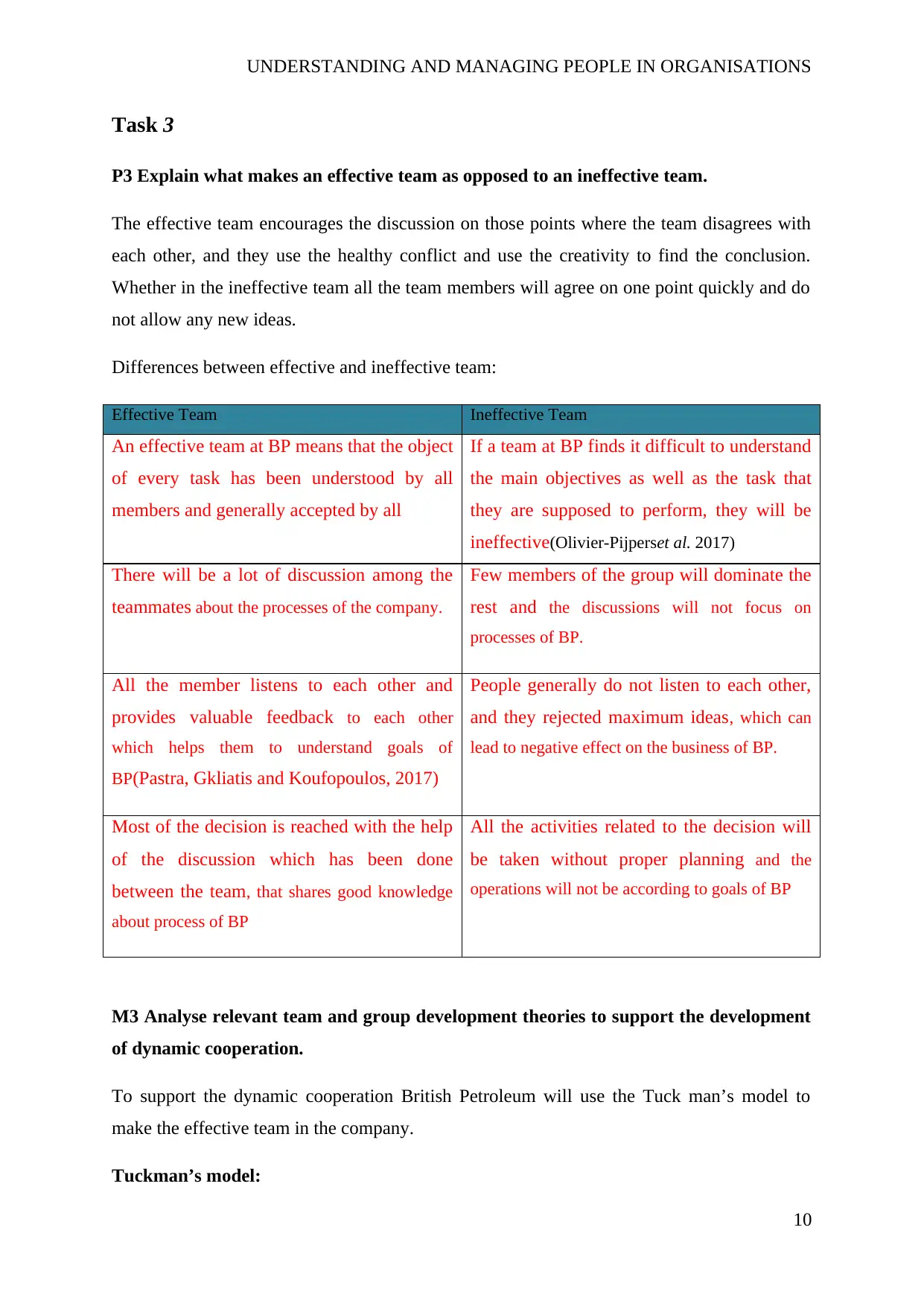
UNDERSTANDING AND MANAGING PEOPLE IN ORGANISATIONS
Task 3
P3 Explain what makes an effective team as opposed to an ineffective team.
The effective team encourages the discussion on those points where the team disagrees with
each other, and they use the healthy conflict and use the creativity to find the conclusion.
Whether in the ineffective team all the team members will agree on one point quickly and do
not allow any new ideas.
Differences between effective and ineffective team:
Effective Team Ineffective Team
An effective team at BP means that the object
of every task has been understood by all
members and generally accepted by all
If a team at BP finds it difficult to understand
the main objectives as well as the task that
they are supposed to perform, they will be
ineffective(Olivier-Pijperset al. 2017)
There will be a lot of discussion among the
teammates about the processes of the company.
Few members of the group will dominate the
rest and the discussions will not focus on
processes of BP.
All the member listens to each other and
provides valuable feedback to each other
which helps them to understand goals of
BP(Pastra, Gkliatis and Koufopoulos, 2017)
People generally do not listen to each other,
and they rejected maximum ideas, which can
lead to negative effect on the business of BP.
Most of the decision is reached with the help
of the discussion which has been done
between the team, that shares good knowledge
about process of BP
All the activities related to the decision will
be taken without proper planning and the
operations will not be according to goals of BP
M3 Analyse relevant team and group development theories to support the development
of dynamic cooperation.
To support the dynamic cooperation British Petroleum will use the Tuck man’s model to
make the effective team in the company.
Tuckman’s model:
10
Task 3
P3 Explain what makes an effective team as opposed to an ineffective team.
The effective team encourages the discussion on those points where the team disagrees with
each other, and they use the healthy conflict and use the creativity to find the conclusion.
Whether in the ineffective team all the team members will agree on one point quickly and do
not allow any new ideas.
Differences between effective and ineffective team:
Effective Team Ineffective Team
An effective team at BP means that the object
of every task has been understood by all
members and generally accepted by all
If a team at BP finds it difficult to understand
the main objectives as well as the task that
they are supposed to perform, they will be
ineffective(Olivier-Pijperset al. 2017)
There will be a lot of discussion among the
teammates about the processes of the company.
Few members of the group will dominate the
rest and the discussions will not focus on
processes of BP.
All the member listens to each other and
provides valuable feedback to each other
which helps them to understand goals of
BP(Pastra, Gkliatis and Koufopoulos, 2017)
People generally do not listen to each other,
and they rejected maximum ideas, which can
lead to negative effect on the business of BP.
Most of the decision is reached with the help
of the discussion which has been done
between the team, that shares good knowledge
about process of BP
All the activities related to the decision will
be taken without proper planning and the
operations will not be according to goals of BP
M3 Analyse relevant team and group development theories to support the development
of dynamic cooperation.
To support the dynamic cooperation British Petroleum will use the Tuck man’s model to
make the effective team in the company.
Tuckman’s model:
10
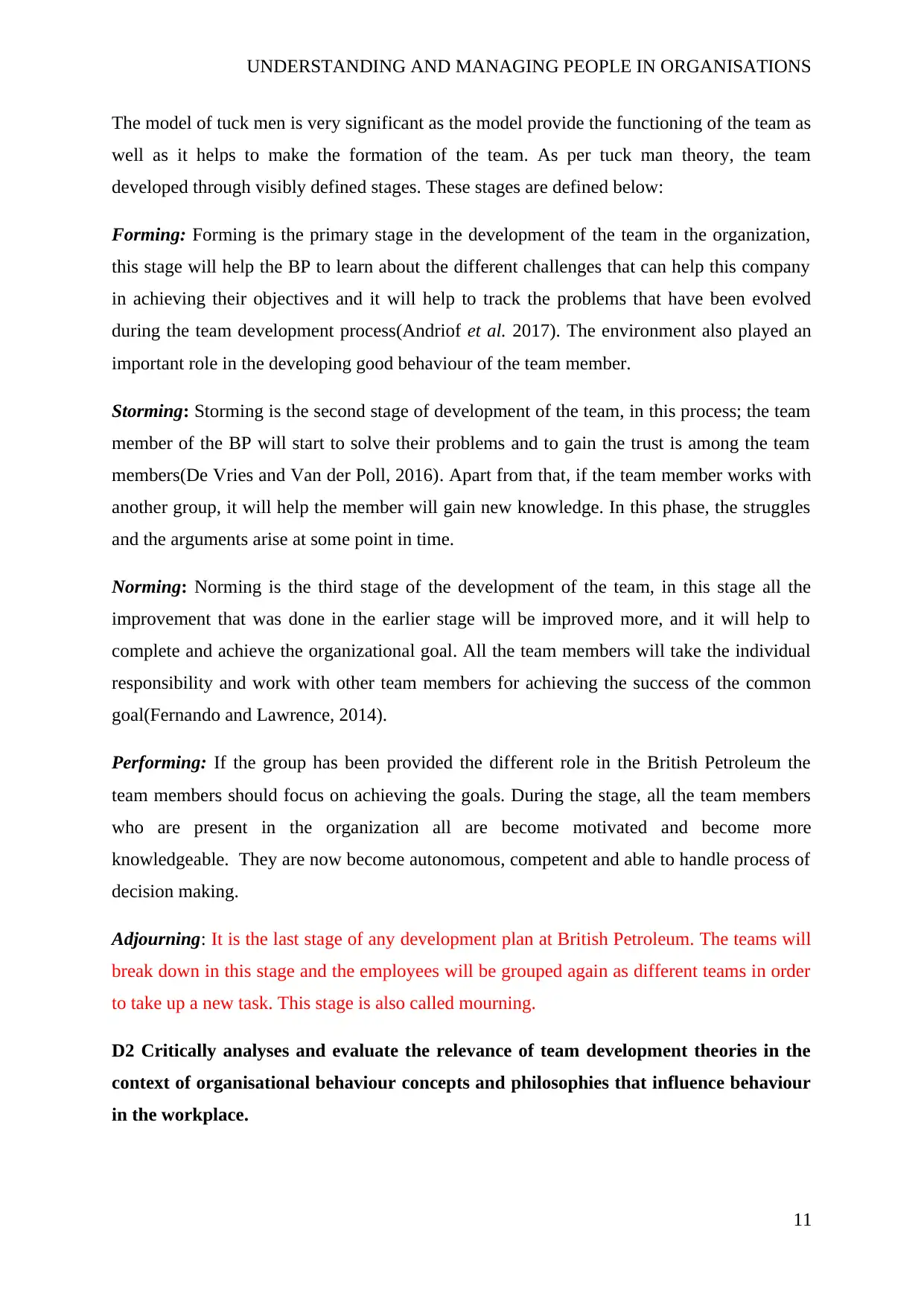
UNDERSTANDING AND MANAGING PEOPLE IN ORGANISATIONS
The model of tuck men is very significant as the model provide the functioning of the team as
well as it helps to make the formation of the team. As per tuck man theory, the team
developed through visibly defined stages. These stages are defined below:
Forming: Forming is the primary stage in the development of the team in the organization,
this stage will help the BP to learn about the different challenges that can help this company
in achieving their objectives and it will help to track the problems that have been evolved
during the team development process(Andriof et al. 2017). The environment also played an
important role in the developing good behaviour of the team member.
Storming: Storming is the second stage of development of the team, in this process; the team
member of the BP will start to solve their problems and to gain the trust is among the team
members(De Vries and Van der Poll, 2016). Apart from that, if the team member works with
another group, it will help the member will gain new knowledge. In this phase, the struggles
and the arguments arise at some point in time.
Norming: Norming is the third stage of the development of the team, in this stage all the
improvement that was done in the earlier stage will be improved more, and it will help to
complete and achieve the organizational goal. All the team members will take the individual
responsibility and work with other team members for achieving the success of the common
goal(Fernando and Lawrence, 2014).
Performing: If the group has been provided the different role in the British Petroleum the
team members should focus on achieving the goals. During the stage, all the team members
who are present in the organization all are become motivated and become more
knowledgeable. They are now become autonomous, competent and able to handle process of
decision making.
Adjourning: It is the last stage of any development plan at British Petroleum. The teams will
break down in this stage and the employees will be grouped again as different teams in order
to take up a new task. This stage is also called mourning.
D2 Critically analyses and evaluate the relevance of team development theories in the
context of organisational behaviour concepts and philosophies that influence behaviour
in the workplace.
11
The model of tuck men is very significant as the model provide the functioning of the team as
well as it helps to make the formation of the team. As per tuck man theory, the team
developed through visibly defined stages. These stages are defined below:
Forming: Forming is the primary stage in the development of the team in the organization,
this stage will help the BP to learn about the different challenges that can help this company
in achieving their objectives and it will help to track the problems that have been evolved
during the team development process(Andriof et al. 2017). The environment also played an
important role in the developing good behaviour of the team member.
Storming: Storming is the second stage of development of the team, in this process; the team
member of the BP will start to solve their problems and to gain the trust is among the team
members(De Vries and Van der Poll, 2016). Apart from that, if the team member works with
another group, it will help the member will gain new knowledge. In this phase, the struggles
and the arguments arise at some point in time.
Norming: Norming is the third stage of the development of the team, in this stage all the
improvement that was done in the earlier stage will be improved more, and it will help to
complete and achieve the organizational goal. All the team members will take the individual
responsibility and work with other team members for achieving the success of the common
goal(Fernando and Lawrence, 2014).
Performing: If the group has been provided the different role in the British Petroleum the
team members should focus on achieving the goals. During the stage, all the team members
who are present in the organization all are become motivated and become more
knowledgeable. They are now become autonomous, competent and able to handle process of
decision making.
Adjourning: It is the last stage of any development plan at British Petroleum. The teams will
break down in this stage and the employees will be grouped again as different teams in order
to take up a new task. This stage is also called mourning.
D2 Critically analyses and evaluate the relevance of team development theories in the
context of organisational behaviour concepts and philosophies that influence behaviour
in the workplace.
11
⊘ This is a preview!⊘
Do you want full access?
Subscribe today to unlock all pages.

Trusted by 1+ million students worldwide
1 out of 17
Related Documents
Your All-in-One AI-Powered Toolkit for Academic Success.
+13062052269
info@desklib.com
Available 24*7 on WhatsApp / Email
![[object Object]](/_next/static/media/star-bottom.7253800d.svg)
Unlock your academic potential
Copyright © 2020–2026 A2Z Services. All Rights Reserved. Developed and managed by ZUCOL.